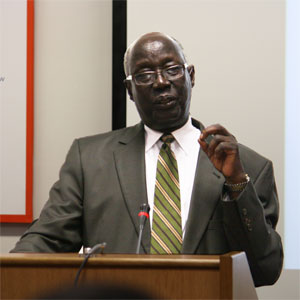Information
Venue
Start
End
11 November 2010 | CIL Distinguished Speaker Series
Understanding and Preventing Mass Atrocity Crimes: A Regional Perspective
Introduction
 Preventing genocide requires understanding the dynamics that contribute to the process of genocide. Genocide can be understood as an extreme manifestation of identity-related conflicts, which emanate not just from perception of differences, but also from the implications of those perceptions in terms of access to power and resources. Conflicts resulting from gross inequalities constitute one of the major causes of genocide, preventing it requires making all efforts for the constructive management of diversity. Given that no country is perfectly homogenous and that internal conflicts often bring broader regional humanitarian and security implications, genocide is truly a global challenge.
Preventing genocide requires understanding the dynamics that contribute to the process of genocide. Genocide can be understood as an extreme manifestation of identity-related conflicts, which emanate not just from perception of differences, but also from the implications of those perceptions in terms of access to power and resources. Conflicts resulting from gross inequalities constitute one of the major causes of genocide, preventing it requires making all efforts for the constructive management of diversity. Given that no country is perfectly homogenous and that internal conflicts often bring broader regional humanitarian and security implications, genocide is truly a global challenge.
The concept of Responsibility to Protect requires that the duty to prevent genocide and mass atrocities lies first and foremost with the State. Such efforts need to be aimed at the promotion of good governance and fundamental human rights, with the ultimate objective of creating an identity framework with which all groups can identify. Sovereignty should not be understood as a ‘shield’ against external interference, but as the ultimate source of responsibility for the management of internal affairs and protection of civilian populations.
Neighboring States, regional and sub-regional organizations, international organizations with global reach, and non-governmental organizations have a distinct and complementary role to play. Increasingly, a divided international community, and preservation of Member States’ strategic and geo-political interests necessitate regional organizations to take up the responsibility to better protect populations in their region. This is the challenge to which every Member State in every region should address and respond.
About the Speaker
UN Secretary-General Ban Ki-moon appointed Dr Francis Deng of Sudan as the Special Adviser on the Prevention of Genocide on 29 May 2007. The Special Adviser acts as a catalyst to raise awareness of the causes and dynamics of genocide, to alert relevant actors where there is a risk of genocide and to advocate and mobilize for appropriate action.
Prior to this, Dr Deng served as Representative of the United Nations Secretary-General on Internally Displaced Persons from 1992 to 2004, and from 2002 to 2003 was also a Senior Fellow at the U.S. Institute of Peace. Dr Deng served as Human Rights Officer in the UN secretariat from 1967 to 1972 and as the Ambassador of Sudan to Canada, Denmark, Finland, Norway, Sweden and the United States. He also served as Sudan’s Minister of State for Foreign Affairs.
Dr Deng is co-recipient with Roberta Cohen of the 2005 Grawemeyer Award for ‘Ideas Improving World Order’ and the 2007 Merage Foundation American Dream Leadership Award. In 2000, Dr Deng also received the Rome Prize for Peace and Humanitarian Action.
Chairperson

Prof Tommy Koh
Chairman, CIL Governing Board
Ambassador-at-Large, MFA
Chairman’s Introductory Remarks
To download Prof Tommy Koh’s introductory remarks in PDF format, click here.


